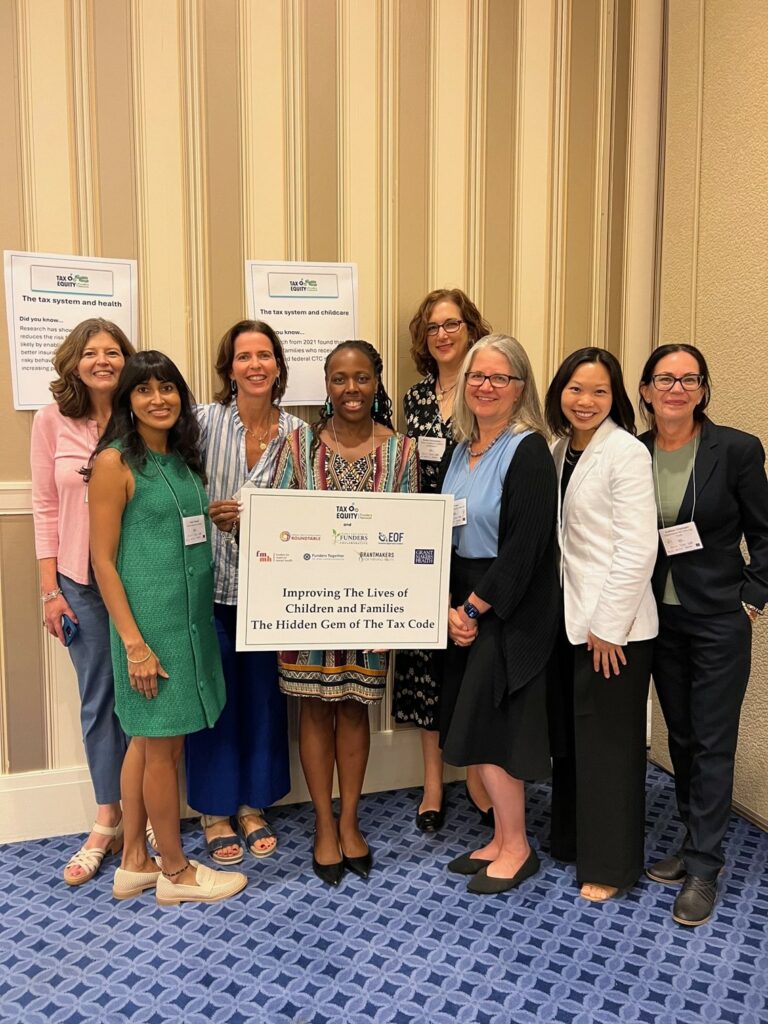Arpita Jindani, Senior Program Director, Grantmakers In Health
At a time when disparities in income and wealth—such as savings, home ownership, and other assets—are widening in America, funders and philanthropic support organizations came together at the Gaylord National Convention Center in National Harbor, Maryland, on September 5, 2024, with a mission to discuss the untapped potential of tax policy in advancing economic mobility. Grantmakers In Health was a co-sponsor for this convening hosted by the Tax Equity Funders Network (TEFN) in collaboration with several other philanthropy support organizations including, Children, Youth and Family Funders Roundtable, Early Childhood Funders Collaborative, Economic Opportunity Funders, Funders Together to End Homelessness, Grantmakers for Thriving Youth, and Funders for Maternal Mental Health. The convening also marked the 20th anniversary of TEFN underscoring the group’s commitment to tax strategies for social impact.

Recent federal initiatives, such as the expansion of the Child Tax Credit and modernization of the Earned Income Tax Credit, have demonstrated the tax code’s potential to positively impact the lives of millions of children and families. This gathering focused on understanding how the tax code serves as a powerful tool for enhancing economic security and building wealth for children and families, particularly within Black and brown communities.
Key Takeaways on Tax Equity
• Tax Equity is a nonpartisan issue that impacts all Americans and enjoys broad bipartisan support across the political spectrum (Simmons-Duffin 2024).
• 2025 presents a crucial opportunity for collaboration and strategic planning, as the expiration of the Tax Cuts and Jobs Act creates an opening to develop a more equitable tax system (Oshagbemi and Sheiner 2024).
Parita Patel from the Robert Wood Johnson Foundation and Ami Nagle from the Tax Equity Funders Network set the stage by emphasizing the link between poverty, federal tax policy, tax systems, and health. This was followed by a panel of speakers including Erica Williams, Executive Director of DC Fiscal Policy Institute; Kathy Stohr, Program Officer at the Pritzker Children’s Initiative; and Mark Constantine, Senior Vice President of Community Investment at the Dogwood Health Trust. Together, the panel painted a sobering picture of how current tax and economic policies disproportionately burden children and families, particularly those from marginalized communities. The conversation underscored the urgency to reshape policies that support economic security for families and create systems where families can thrive. A significant point raised during the panel was the multiple structural barriers in the current system that perpetuate cycles of poverty for children and families. In this context, the panel highlighted the critical health benefits of the Earned Income Tax Credit (EITC), which not only provides financial relief to low-income families but has been linked to better health outcomes.
The next session was an interactive activity led by Deneisha Thompson from the Tax Equity Funders Network, which quickly became a crowd favorite. Attendees were presented with a scenario involving a funding organization facing implementation challenges, and the attendees collaborated to identify policies and strategies that could enhance economic security and equity within the tax code. This exercise offered a unique opportunity for participants to explore tax code strategies, from expanding tax credits through outreach and awareness to addressing inequities in the tax system through advocacy. This activity also allowed attendees to discuss how tax reforms and tax repairs can be leveraged to improve equity.
Building on the insights from the convening, here are a few critical questions to consider for health funders who are new to tax equity:
- How can we leverage tax policy to advance health equity?
- How can we support outreach and education around tax benefits?
- What partnerships or collaborations are needed to drive systemic change on tax equity?
- What policy and advocacy effort should my foundation be focusing on?
Please let us know how GIH can support your interests on the topic of tax equity by reaching out to Arpita Jindani.
References
Simmons-Duffin, Selena. “What you need to know about the child tax credit as both campaigns embrace it”. National Public Radio, August 15, 2024.
Oshagbemi, Comfort and Louise Sheiner. “Which provisions of the Tax Cuts and Jobs Act expire in 2025?” Brookings Institution, September 5, 2024.

